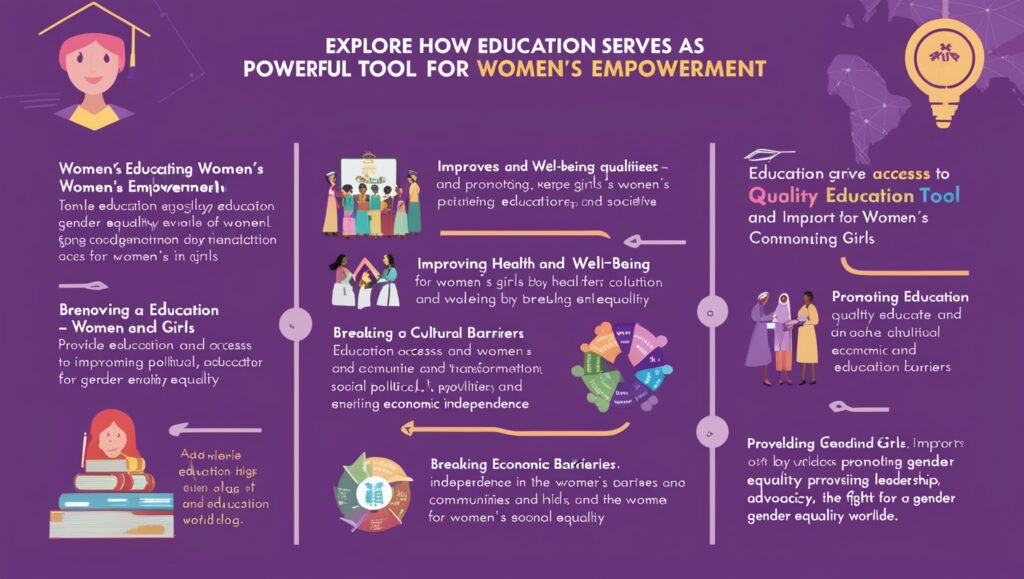The Role of Education in Women Empowerment
Education is often referred to as the key to unlocking opportunities, and nowhere is this truer than in the context of women’s empowerment. Education not only equips women with the knowledge and skills to improve their lives but also serves as a catalyst for social change, gender equality, and the transformation of entire communities. The benefits of education extend beyond individual development, enabling women to have greater control over their health, finances, and careers, thereby fostering a more equitable society. In this blog, we will explore how education plays a pivotal role in empowering women and driving social progress.
1. Breaking the Cycle of Poverty
One of the most profound ways education empowers women is by providing them with the tools to break free from the cycle of poverty. When women receive an education, they are more likely to secure stable and well-paying jobs. This financial independence reduces their vulnerability to exploitation and poverty, both of which disproportionately affect women in many parts of the world. Educated women are better equipped to contribute to their families’ incomes, improving living standards, access to healthcare, and overall quality of life.
Education also plays a crucial role in shaping a woman’s aspirations. By gaining knowledge, women are able to envision a better future for themselves and their families. They are empowered to pursue careers, start businesses, and make informed decisions about their lives. Furthermore, educated women are more likely to invest in the education of their children, thus creating a virtuous cycle that uplifts future generations.
2. Promoting Gender Equality
Gender inequality remains a significant barrier to the full participation of women in society. Education is one of the most effective tools for challenging and changing these inequalities. It provides women with the knowledge to understand their rights, challenge discrimination, and demand equal treatment in all aspects of life. When women are educated, they are better equipped to advocate for themselves, their families, and their communities.
Education also fosters awareness of gender stereotypes and social norms, enabling women to challenge and dismantle traditional expectations that limit their opportunities. Through education, women can become leaders and change-makers in their communities, driving the movement for gender equality and social justice.
3. Improving Health and Well-being
Educated women tend to make healthier choices for themselves and their families. Education provides women with the knowledge to understand the importance of nutrition, exercise, and hygiene, as well as how to prevent and manage diseases. This is especially crucial in areas where health literacy is low, and access to healthcare may be limited.
Moreover, educated women are more likely to access prenatal care, give birth in safer conditions, and make informed decisions about family planning. They are also better equipped to advocate for better healthcare services in their communities. This, in turn, has a ripple effect, leading to healthier families and communities overall.
4. Increasing Political Participation
Education empowers women to become active participants in political and civic life. Educated women are more likely to vote, engage in community decision-making processes, and take on leadership roles in government and other institutions. This increased political participation helps ensure that women’s voices are heard in matters that directly impact their lives.
Women in leadership positions can create policies that support gender equality, healthcare, education, and economic empowerment. By gaining an education, women are not only able to improve their own lives but also contribute to the development of more inclusive, progressive societies.
5. Breaking Cultural Barriers
In many parts of the world, cultural norms and traditions often place limitations on women’s roles and rights. However, education can challenge these cultural norms and empower women to claim their space in society. It provides them with the ability to challenge patriarchal structures that limit their potential. In societies where girls are often discouraged from pursuing education, the encouragement of female education can lead to long-term cultural change, where girls and women are seen as equal contributors to the economic, social, and political fabric of society.
Furthermore, education helps women to develop confidence and self-reliance. It provides them with the tools to not only pursue their career or business interests but also make independent choices about their personal lives. This can help women challenge harmful practices like child marriage and domestic violence.
6. Education as a Tool for Social Change
The impact of education extends beyond individuals to entire communities. Educated women are often at the forefront of social change. They lead efforts to promote environmental sustainability, advocate for children’s education, and fight against corruption and injustice. By participating in community development, women can address local issues such as water access, sanitation, and education, creating long-term, sustainable change in their communities.
Moreover, educated women can play a significant role in advancing human rights. They are more likely to fight for justice, equality, and the protection of vulnerable populations. This influence ripples through generations, fostering a culture of respect, empowerment, and progress.
Final Thoughts
The role of education in women’s empowerment cannot be overstated. It is one of the most powerful tools to challenge systemic gender inequality, improve economic and health outcomes, and create more just societies. When women are educated, they not only transform their own lives but also uplift their families, communities, and countries. For education to truly empower women, it must be accessible, inclusive, and free from gender-based discrimination. Governments, NGOs, and society as a whole must continue to prioritize and invest in women’s education to ensure that every girl has the opportunity to fulfill her potential and contribute to a brighter, more equal future for all.
By recognizing the transformative power of education and actively working to provide it to all women and girls, we can create a world where women are no longer limited by their circumstances but are empowered to lead, innovate, and shape their destinies. Education is not just a right—it is a path to empowerment, equality, and progress for all.

